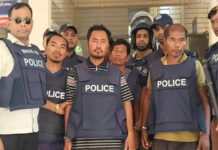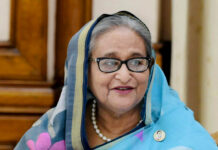PM urges world community

Prime Minister Sheikh Hasina has called upon the world community to invest in quality education by diverting billions of dollars spent for creating war machines and violence.
“We must divert billions we spend for creating war machines and violence to educating our progeny for the world we want. Let’s all invest in quality education for a culture of peace and non-violence,” she said.
The prime minister was speaking at a discussion of a high-level event on the UN secretary-general’s Global Education First Initiative (GEFI) at Trusteeship Council at the UN headquarters here on Wednesday afternoon.
The GEFI must build global partnerships and consensus for resources to promote quality education, she insisted.
As Tunisian President Moncef Marzouki drew attention of the GEFI leaders to the fact that millions of children in Gaza City of Palestine cannot go to schools due to Israeli atrocities, Hasina said the situation in Gaza is not acceptable. She urged all to raise voice against what is happening in Gaza.
The Millennium Development Goals, said the PM, helped Bangladesh champion access to education and gender parity. “In the post-2015 era, our priority must be quality education,” she observed.
Bangladesh will have more than 120 million young and active workforce by 2031, added the premier. “My government is determined to unlock their talents and transform them into skilled human capital.”
Pointing out that quality education needs quality teachers, she said her government has trained nearly a million secondary teachers in quality teaching and evaluation methods.
The government, mentioned Hasina, has reserved 60 percent teaching positions in primary schools for qualified women.
In a low-income-country, quality education must ensure access to free textbooks and contemporary curricula, she noted. “Only in 2014, we distributed 318 million free textbooks among primary and secondary students.”
She said a new national curriculum and a creative assessment system have been developed, while the madrasa education has been reformed.
Quality education must include ICT knowledge based aspects, and in Bangladesh, ICT knowledge is compulsory for secondary and higher secondary students, said the premier.
She added: “The government is implementing a rigorous ICT master plan for education to materialise its vision for building a technology-driven society through Digital Bangladesh.”
A well-rounded early learning is the key to quality education and that is why Bangladesh has introduced free pre-primary classes in all primary schools, said the PM, adding that the government is providing students with free midday meals to check dropouts.
“Just in 2013, we gave stipends to nearly 12.8 million meritorious secondary-to-bachelor’s students to ensure continued learning. Girls received 75 percent of the stipends,” mentioned Hasina.
She said the aim of her government is also to create skilled youths for job markets at home and abroad. “Over the last five years, we have increased number of graduates in technical and vocational education training by seven-fold,” added the PM.
Quality education must ensure inclusion of the excluded, she observed. “Bangladesh is developing a law towards a uniform education system covering nearly 70 million young learners, from mainstream, madrasas and minorities,” said the premier.
Girls’ and women’s education, she said, must remain a pillar of quality education. “We need resources for quality education, and this fiscal, Bangladesh allocated 11.6 percent of its budget for education.”
Health Minister Mohammad Nasim, Foreign Minister AH Mahmood Ali, Expatriates Welfare and Overseas Employment Minister Engineer Khandaker Mosharraf Hossain and international autism expert and PM’s daughter Saima Hossain Putul were present, among others.
United Nations Secretary-General Ban Ki-moon had launched the GEFI in September 2012 to spur renewed efforts to reach global education goals.
By rallying a broad spectrum of world leaders and advocates, GEFI aims to raise the political profile of education, inspire new partnerships and mobilise additional funding to deliver on the promise of Education for All. The initiative focuses on three priority areas — putting every child in school, improving the quality of learning and fostering global citizenship.
C’WEALTH SECY MEETS PM
The Commonwealth is going to undertake a new agenda for the development of education of girl children and women.
Commonwealth Secretary General Kamalesh Sharma said this when he paid a courtesy call on Prime Minister Sheikh Hasina at her hotel suite in New York on Wednesday afternoon.
Briefing reporters after the meeting, PM’s Press Secretary AKM Shamim Chowdhury said Kamalesh apprised the PM of the policy and programmes of the Commonwealth.
Kamalesh also informed the PM about today’s CHOGM meeting at the UN headquarters.
Highlighting her government’s steps for the development of education, the PM said Father of the Nation Bangabandhu Sheikh Mujibur Rahman, soon after the country’s independence, had nationalised the primary education and the services of teachers. The government has made girls’ education free up to the higher secondary level, she added.
Foreign Minister A H Mahmood Ali, PM’s Principal Secretary Abdus Sobhan Sikdar and PMO Secretary Abul Kalam Azad were present.
The Commonwealth official is scheduled to visit Bangladesh in December.
Source: The Daily Star









